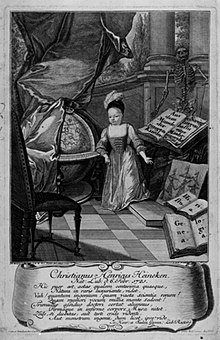Christian Heinrich Heineken


Christian Heinrich Heineken or Heinecken (February 6, 1721 – June 27, 1725), also known as "the infant scholar of Lübeck", was a German child prodigy who lived only to the age of four.
Life
[edit]He was born in the Prince-Bishopric of Lübeck, Germany, the son of Paul Heinecken (1674–1746), a painter and architect, and Catharina Elisabeth Heinecken (1683–1757), an artist and alchemist.[1][2] His brother, Carl Heinrich von Heineken, became an art historian and collector and was later knighted.[2]
It is said that when he was ten months old, he could speak German. He read the Pentateuch at age one,[1] and between the ages of two and three, he read the Old and New Testaments in Latin.[1] When he was three years old, he was said to have recited his own History of Denmark when visiting the King of Denmark.[1] Also at three, he testified in court concerning the murder of his friend, another boy named Reid.[1] He died at age four of celiac disease.[3] He was breastfed until close to his death, which was caused very likely by the ingestion of grain products.[4]
While his exploits may seem difficult to believe, they are relatively well documented. In 1726, his tutor (a man named Schöneich) published a study of Christian entitled The Life, Deeds, Travels and Death of the Child of Lübeck.[1][5] Immanuel Kant, in his book Anthropology from a Pragmatic Point of View, cited Heineken as an "ingenium praecox" (someone "prematurely clever").[6]
See also
[edit]References
[edit]- ^ a b c d e f Chisholm, Hugh, ed. (1911). . Encyclopædia Britannica. Vol. 13 (11th ed.). Cambridge University Press. pp. 215–216.
- ^ a b Vollmer, Hans (ed.), Allgemeines Lexikon der Bildenden Künstler von der Antike bis zur Gegenwart (General Dictionary of Visual Artists from Antiquity to the Present). Vol. 16, p. 292; vol 21, p. 530; vol. 25, p. 575. Leipzig: EA Seemann, 1923. (In German)
- ^ "Unsterblichkeit der Frühe". Süddeutsche Zeitung. Feuilleton (in German). January 17, 2004. p. 15. Archived from the original on July 21, 2006.
- ^ Kaus J. Hennig (22 December 1999). "Ein Kind zum Anbeten" (in German). Zeit Online GmbH, Hamburg, Germany.
- ^ "The Child of Lubeck". Everything.com.
- ^ Kant, Immanuel, Anthropology from a Pragmatic Point of View, Victor Lyle Dowdell, transl., p.127 (Carbondale, Illinois: Southern Illinois University Press, 1978) (retrieved Jan. 28, 2024).
Other sources
[edit]- Barlow, F. Mental prodigies. New York: Philosophical Library, 1952.
- Hollingworth, Leta S., Children Above IQ 180 Stanford-Binet: Origin and Development, Part One, Chapter 3 (1942) (retrieved Jan. 28, 2024).
- Long, G. (ed.). Penny Cyclopaedia. Society for the Diffusion of Useful Knowledge, 1838.
- Guido Guerzoni: The Wonderboy of Lübeck. The extraordinary life of Christian Heinrich Heinecken (English Edition). Turin 2006.
